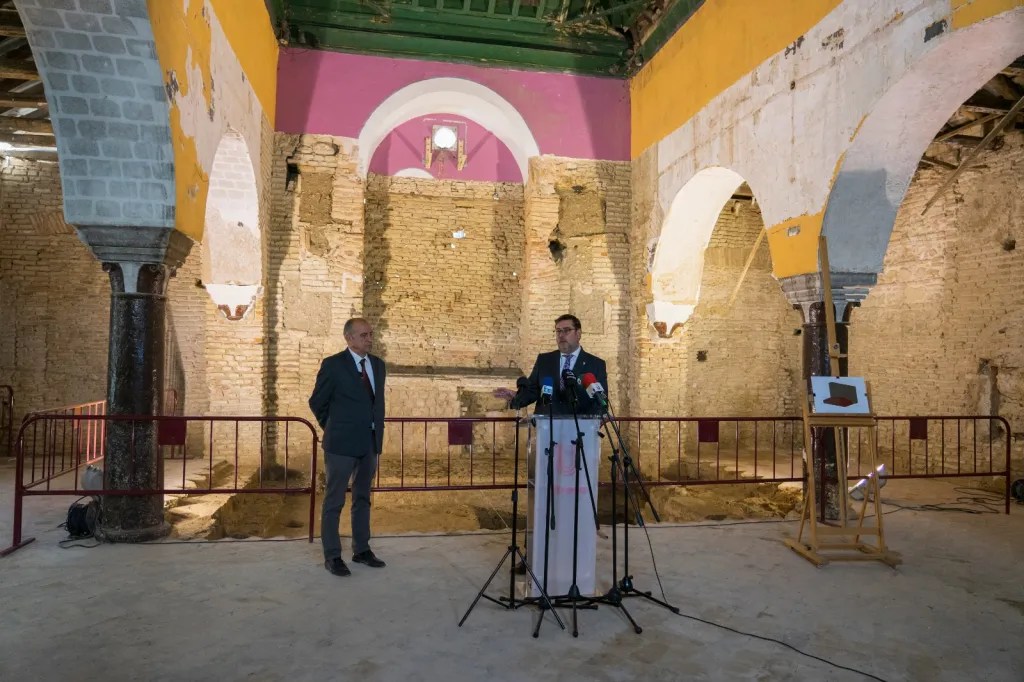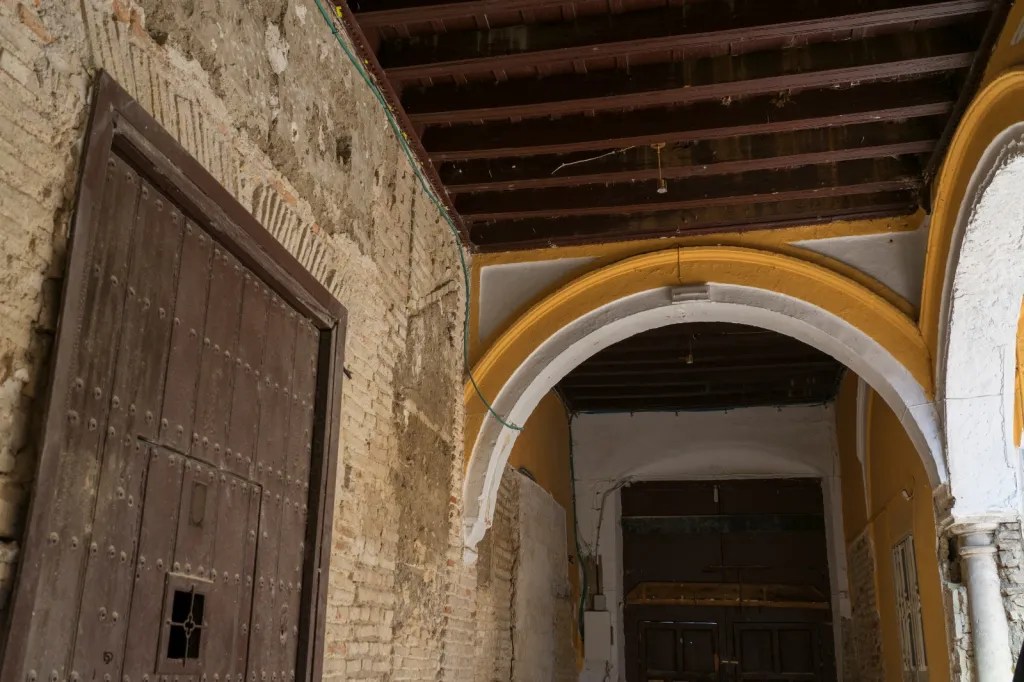

Representantes de las diferentes comunidades religiosas que habitan de forma mayoritaria la ciudad de Ceuta expusieron la visión del ayuno en cada una de las diferentes culturas.
Una noche muy especial



Representantes de las diferentes comunidades religiosas que habitan de forma mayoritaria la ciudad de Ceuta expusieron la visión del ayuno en cada una de las diferentes culturas.
Una noche muy especial
Talking about the Brother hoof of Madrid and Tel Aviv
The place is Utrera, near Seville, in Spain.
Archaeological work carried out in a 15th-century hospital in Utrera has brought to light the most important synagogal complex found in the Iberian Peninsula, references to which were made by the historian Rodrigo Caro around the year 1604.
As reported at a press conference by the mayor of the town, José María Villalobos, the archaeological complex has seen the light after works started in November 2021 in the house known as ‘Niño Perdido’, where the Hospital de la Misericordia was located; Rodrigo Caro already mentioned that it was built on the remains of a synagogue.























Tu BiShvat (Hebrew: ט״ו בִּשְׁבָט, romanized: Ṭū BiŠəvāṭ, lit. ’15th of Shevat’) is a Jewish holiday occurring on the 15th day of the Hebrew month of Shevat (in 2023, Tu BiShvat begins at sunset on February 5 and ends in the evening of February 6). It is also called Rosh HaShanah La’Ilanot (Hebrew: ראש השנה לאילנות), literally “New Year of the Trees”. In contemporary Israel, the day is celebrated as an ecological awareness day, and trees are planted in celebration.




The Jewish Coomunity of Ceuta, as every year, join to the Jewish International Community in order to conmemorate the Remembrace Day. The event took place in teh Main Synagogue of Ceuta and had presence of the Major of The City, the Central Government Representant, the General Commander of the Sanosh Army in Ceuta and many other political and social representatives of Ceuta.


Last Feb 1st took place in Ceuta the presentation of “The litte Prince” the world famous work of Antoine the Saint-Exupery translated into Haketia.
If you are wondering what is Haketia, in a nutshell, Haketia is to the Jweish Population from North Morocco what Yiddish is to the Azkenazim. Basically the Haketia is Spanish, which has twisted with hebrew and arabic, and a very featured tone for the speaker to get a new language.
In 1492 the Jewish population expelled from Spain who came to live to Northern Afirca, kets the language for genaratiosn adding some local idioms plsu Hebrew (hence the “twisting”). In 1859 when the Spanish Army invaed North Africa (the War in Africa is called in Histiry books), they became aware about those “strange people” (the Jews) living inside the Jewish Quarters who spoke a very similar languge to the Spanish.
In Ceuta we had the pleasure of having the presentation of this book by his editor.

El pasado 1 de febrero tuvo lugar en Ceuta la presentación de “El pequeño precio”, la mundialmente conocida obra de Antoine de Saint-Exupéry traducida al haketia.
Si te preguntas qué es Haketia, en pocas palabras, Haketia es para la población judía del norte de Marruecos lo que el yiddish es para los azkenazim. Básicamente la Haketia es el español, que se ha torcido con el hebreo y el árabe, y un tono muy destacado para que el hablante adquiera un nuevo idioma.
En 1492 la población judía expulsada de España que vino a vivir al norte de África, toma la lengua por generaciones añadiendo algunos modismos locales al hebreo (de ahí la “torsión”). En 1859 cuando el ejército español invadió el norte de África (la Guerra de África se llama en los libros de Historia), se percataron de la existencia de esa “gente extraña” (los judíos) que vivían dentro de las juderías y que hablaban un idioma muy similar al español.
En Ceuta tuvimoss el placer de contar con la presentación de este libro por parte de su editor.



On March 21, the Ceuta Israelite Community (CIC) dressed in its best clothes to receive the visit of Rodica Radian-Gordon, Ambassador of Israel in Spain. The CIC Board of Directors and the Ambassador held a private meeting; A wonderful dinner was then served, attended by a representation of the members of the Community. During dinner, both the Ambassador and Mr. José Bentolila, President of the CIC, addressed speeches to the audience, where both sides highlighted the marked Zionist character that has always stood out in the Israeli Community of Ceuta, as well as the great penetration in the Spanish scientific community that the scientific and didactic investigations that are being carried out in Israel are having.
Today, the fourth day of Hanukkah, the Israeli Community of Ceuta has organized its traditional “Hanukkah in the Street”, which this year has consisted of a  simple ceremony, broadcast online, from the Bet El Temple, the center of Jewish life in this city . Traditionally, the Israelite Community of Ceuta dedicates this lighting to a group of the City, and this year, how could it be otherwise, this lighting has been dedicated to all the Sanitarians and Sanitary authorities of this beautiful City, women and men, that are the first line of action against the World Pandemic that the Covid-19 virus supposes.
simple ceremony, broadcast online, from the Bet El Temple, the center of Jewish life in this city . Traditionally, the Israelite Community of Ceuta dedicates this lighting to a group of the City, and this year, how could it be otherwise, this lighting has been dedicated to all the Sanitarians and Sanitary authorities of this beautiful City, women and men, that are the first line of action against the World Pandemic that the Covid-19 virus supposes.
The event was presented by Don Jacob Hachuel, a nurse and an illustrious member of this Community, who in a sense of speech thanked him heartily for the work that each and one of the members of this great group of doctors and health workers perform in the City, not only now under the dark threat of the Pandemic, but at every moment of their lives; vocational lives dedicated to the care and healing of the sick.
Representatives of the group of doctors, nurses, assistants, orderlies and cleaning and maintenance staff of the University Hospital of Ceuta shared this honor, which served as a humble tribute by the Community.
The event closed with a word from the President of the Israelite Community of Ceuta, José Bentolila, who touched everyone’s hearts, citing the words of Doctor Cavadas, who in turn quotes the Talmud with “who saves a life, saves the World ”, And also valued the work that this group is carrying out at that time, not only for their commendable work that they carry out with so much dedication in their day-to-day lives, but also the great humanitarian work they are carrying out as“ the most close to the sick ”.
The small group of guests was able to enjoy some “sufganiyot” one of the typical sweets of this Festival that were delivered to take away.
















In the meeting, in which the general director of Peace, Coexistence and Human Rights Martín Zabalza and management staff participated, the president of the recently inaugurated Auschwitz Birkenau National Institute in Spain and its director of education, Álvaro Enrique de Villamor Soraluce and Eduardo de Ocampo Martínez.
The Foundation, whose objective is the development of thinking in the field of historical memory, human rights and education, has initiated a round of contacts with different autonomous governments, universities, foundations and public and private institutions in communities such as La Rioja, the Basque Country, Navarra, Castilla y León and Cantabria.
At the meeting, both delegations have been able to share experiences in education and memory.
The Auschwitz Birkenau National Institute aims to “educate in critical thinking, warning of the danger of populism and extreme thinking.”